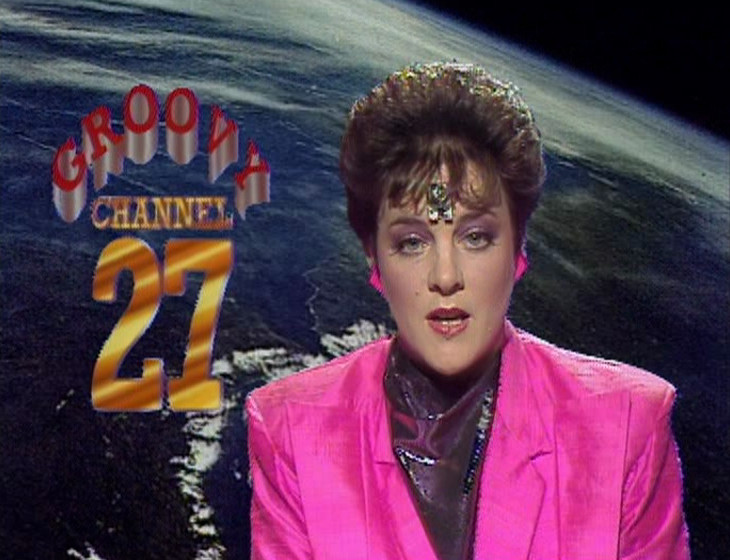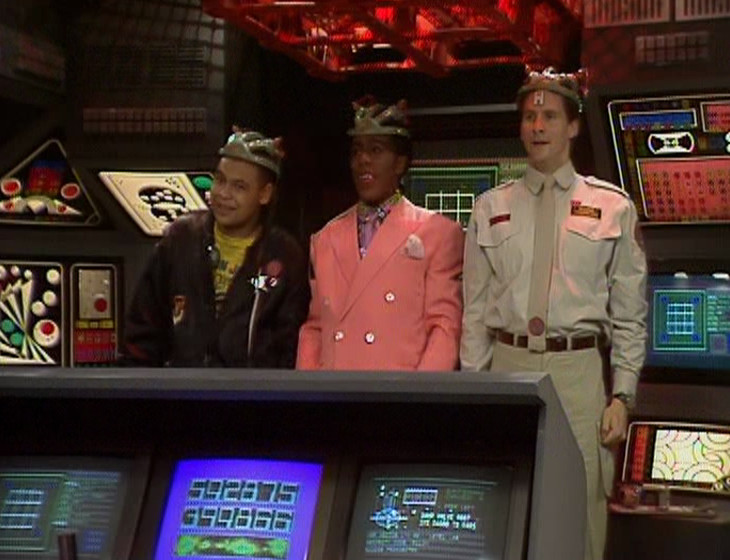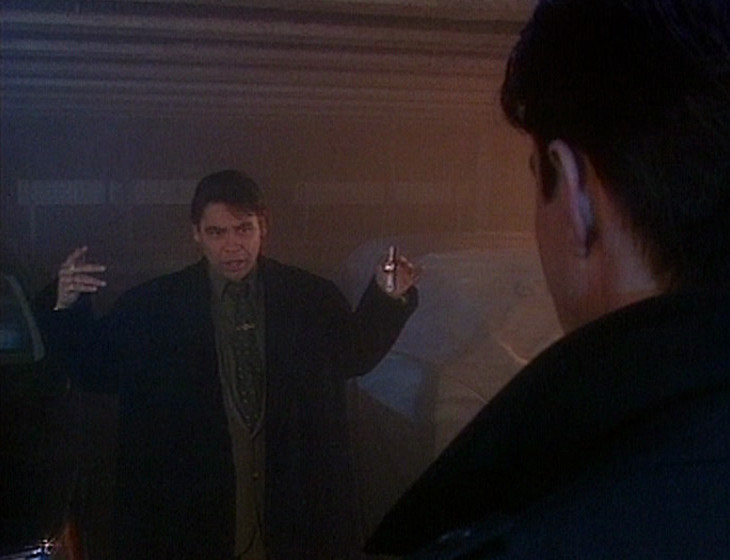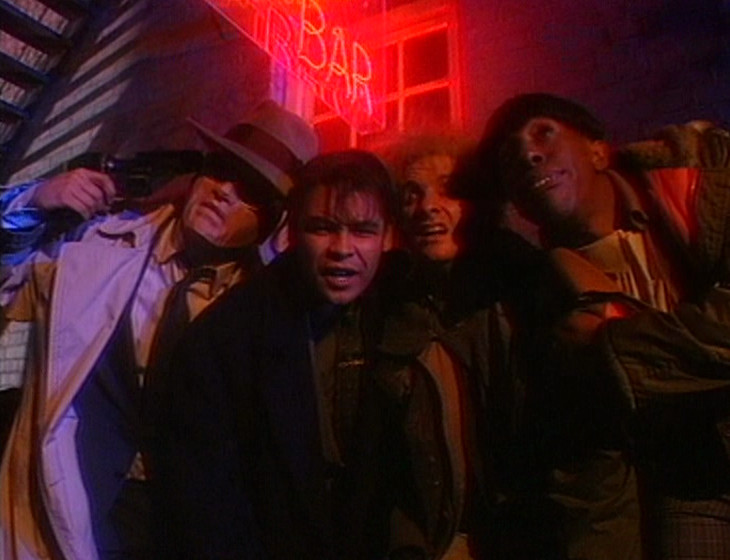“I alter people’s perception of reality.” – Dr. Hypnosis
One recurring theme in Red Dwarf has always been the rather tenuous grip on real life the crew have. Whether it’s the Total Immersion Videogame of “Better Than Life”, the hallucinations suffered in “Back to Reality”, those damn reality pockets in “Out of Time” – to name three of many – people’s perception of reality is something which Grant Naylor return to time and time again.
What’s interesting, however, is that Red Dwarf is far from the first time Grant Naylor have explored this idea. In fact, we can trace their fascination with it right back to their very first solo writing credit: the first episode of Radio 4 sketch show Cliché, broadcast on the 16th March 1981. Though unlike Red Dwarf, it isn’t framed in terms of science fiction.
I present to you the strange adventure of Dr. Hypnosis: his real name… Dr. Hypnosis.
Download “Cliché – Dr. Hypnosis”
When examining Rob and Doug’s early radio stuff, we might have expected jokes about hypnotism to be a riff on books titled “How To Pick Up Girls By Hypnosis” and the like. Just one-liners – fun enough in their own right, but to be developed far more fully later on. We’re a long way from that here.
This sketch is a joke about people imagining and doing things in a fantasy world, when in real life things are entirely different. And the most obvious example of this kind of joke in early Red Dwarf is in “Better Than Life” (TX: 13/09/88).
The concept is even introduced to us in a similar way: through a parody of the media. Cliché uses a reporter:
REPORTER: Harley Street, London: renowned throughout the world as a centre for specialised medicine. For years, the very cornerstone of established medical practice. But now: something sinister, something threatening is housed here, in this small terraced building. For this is the practice of a man who calls himself Dr Hypnosis: his real name… Dr. Hypnosis. He claims to provide hope for the otherwise hopeless. Is he a charlatan? Or is he a fake? With an open mind, I talked to him this morning.
Dr. Hypnosis, essentially what so-called services do you purport to offer?
DR. HYPNOSIS: Self-delusion. I hypnotise people into believing things that are not true.
REPORTER: Why?
DR. HYPNOSIS: To bring them happiness.
“Better Than Life”, meanwhile, uses a newsreader:
NEWSREADER: Techno news. The new sensation sweeping the solar system is the total immersion video game, “Better Than Life.” Using the new senso lock feedback technology, “Better Than Life” is able to detect all your desires and fantasies and then make them come true. So great is the appeal of “Better Than Life” when one store in New Tokyo ran out of stocks, rubber nuclear weapons had to be deployed to disperse the crowd.


However, Dr. Hypnosis quickly deviates from how the TV series deals with Better Than Life, and becomes something far more akin to the more unpleasant version of the game depicted in the later Red Dwarf novels. Sure, the game in the TV series is all about the crew experiencing a different kind of reality: but ultimately, it’s just a game, and our crew know it’s just a game. The sketch treads into darker territory: into pure self-delusion. For instance, about the physical health of Dr. Hypnosis’s patients:
REPORTER: What about the case of the chronically short-sighted woman? You convinced her she could see without her glasses.
DR. HYPNOSIS: She’s happy.
REPORTER: She walked off a cliff.
DR. HYPNOSIS: She’s better now.
REPORTER: She’s in traction!
DR. HYPNOSIS: She doesn’t think she’s in traction. She thinks she’s relaxing on a beach in Barbados.
This reminds me very much of the following from the novel Infinity Welcomes Careful Drivers, published the year after the TV version of “Better Than Life”:
“But over the months the Cat’s and Lister’s bodies had started to wither. Sometimes they’d spend weeks in a single position and develop huge bedsores. They’d tumble down stairs and get up, bloody and laughing, believing they’d made a parachute jump or some such thing.”
Indeed, the most important distinction between the TV and book versions of Better Than Life is that in the book, the crew doesn’t actually know that they started playing the game. Again, Infinity Welcomes Careful Drivers has the following conversation between Lister and Rimmer:
“‘Look, if we are in the Game, we won’t know we’re in the Game. It protects itself – it won’t let you remember that you’ve started to play it.’
‘But we didn’t start to play it.’
‘No, we don’t remember starting to play it. That’s different.'”
This idea – that the patient doesn’t know that their understanding of reality is flawed – is present throughout the radio sketch, but perhaps best expressed in the closing moments with our (male) reporter:
REPORTER: Well, those are the facts. As a final test, I allowed myself to take part in one of his group sessions this morning. Hypnotic suggestion doesn’t work, unless you want it to work. It certainly didn’t work on me. I’m still the same attractive woman I’ve always been. I’m still invisible. I still have the same magic flying shoes. And all the money I earn still goes to Dr. Hypnosis, as it always did.
The effect of this in both the radio and book versions is of something far more chilling than what was portrayed on TV. Indeed, it took until three series later, and “Back to Reality” (TX:26/03/92), that this level of delusion made its way onto our screens:
SEBASTIAN: You know me?
COP: Of course, Voter Colonel.
SEBASTIAN: Who am I?
COP: You are… Colonel Sebastian Doyle. Section chief of CGI. Head of the Ministry of Alteration.
SEBASTIAN: Remind me a little. What exactly do we do at the… “Ministry of Alteration”?
COP: You… change people, Voter Colonel.
SEBASTIAN: In what way?
COP: You change them from being alive people, to being dead people. To purify democracy.
BILLY: Purify?
COP: No one has done more to purge the ballot boxes than the Voter Colonel.


Of course, “Back to Reality” is all about destroying the minds of our heroes, rather than sating them. The above is so chilling because Lister truly believes he is Sebastian, a “mass-murdering butcher in a totalitarian state”. But the above scene is the ultimate development of an idea which had its beginnings in the very first episode of Cliché.
Which is perhaps an odd thing to say about an episode which initially seems to be as science fiction as Red Dwarf gets. The Cliché sketch shows that the basic ideas of episodes like “Better Than Life” and “Back to Reality” really don’t rely on overt science fiction concepts as much as they first appear. Total Immersion Videogames, hallucinations brought on by super-evolved squids, hypnotism: it’s all the same thing. Time and time again, ideas in Red Dwarf which seem to be only possible in a SF context prove to be easily achievable without the SF element being present at all. Perhaps Red Dwarf really is less of a science fiction series than it first appears.
Which brings us to Son of Cliché from 1983-4, the other, more famous radio sketch show written by Grant Naylor. Whenever antecedents to Red Dwarf are discussed, the Son of Cliché “Dave Hollins: Space Cadet” sketches are usually top of the list, and it would be foolish to deny their place in Dwarf‘s history – not least because Grant Naylor always give them as the starting point.
But Red Dwarf ended up being very, very different to those Dave Hollins sketches, and I wonder whether one reason they are compared so heavily is because they are both ostensibly science fiction ideas. This Dr. Hypnosis sketch feels to me to be at the very least equal to Dave Hollins in terms of the kind of show Red Dwarf ended up as. The nature of reality is a far more fundamental part of Red Dwarf than NORWEB jokes, however amusing NORWEB jokes are.
“We should not be slaves to reality.” – Dr. Hypnosis
Yes, it’s always interesting to see early versions of jokes in Rob and Doug’s early stuff, refined and improved by the time they appear in Red Dwarf. But this is altogether deeper, and altogether more exciting. This is an early version of an obsession Rob and Doug would keep returning to for years and years, reaching its height with “Back to Reality” – without exaggeration, one of the finest episodes of sitcom the BBC ever made.
Hidden away on a Radio 4 sketch show in 1981.
A version of this post was first published on Ganymede & Titan in July 2017.
